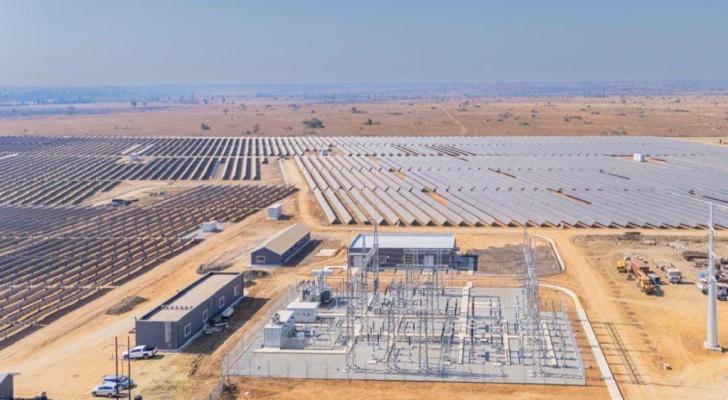News / National
Zim targets 1,8 million solar systems by 2030
20 May 2025 at 18:04hrs |
0 Views

HARARE - Zimbabwean population needs over a million and eight-hundred thousand (1,8 million) solar infrastructure-related systems to be installed countrywide as safe alternative to resolve possible energy crisis, with projection of 500 megawatts (of energy) needed by 2030 since 61% households are still using firewood, Ministry of Energy and Power Development has announced.
Speaking at an opportunity session for European companies in renewable energy projects including incentives during the ongoing 2025 European Union-Zimbabwe Business Forum in Harare this Tuesday, Permanent Secretary in the Ministry, Engineer Gloria Magombo pleaded that the country is investment-conducive and has potential to use eco-friendly forms of energy.
"There are several opportunities for investing in renewable energy projects throughout the country and we are ready partner and do business. By the year 2030, we will be needing 500 megawatts of energy," Magombo said.
"Meanwhile, 61% of the country's population is still using firewood and we have crafted five pillars needing implementation as ways of improving clean cooking. Some of these include use of gas (both biogas and LPG), efficient cook stoves, electronic cooking (e-cooking), solar cookers, among others," Magombo added.
"To fully achieve cleaner and safer renewable energy projects throughout the country, Zimbabwe needs 1,8 million solar systems and infrastructure to be installed through possible business investment opportunities. We are ready to have such investment and partnership in the country," Magombo pleaded.
Just recently and during the inaugural Rural Industrialisation Indaba at the Zimbabwe International Exhibition Centre (ZIEC), Engineer Gloria Magombo said about 80 percent of the country's rural population has no electricity and energy for productive use and the country's electrification rate is at 62 percent, with only about 20 percent of the rural population having access to electricity from both grid and off-grid systems.
Magombo claimed energy access, particularly electricity, is important for driving rural industrialization as it empowers productive use of energy (PUE) and supports essential sectors like agriculture, mining, tourism and manufacturing.
“Reliable and affordable energy enables small-scale businesses, improves agricultural productivity, and fosters economic growth in rural areas. With the devolution agenda of the Second Republic and the mantra for leaving no one and no place behind, energy access in the rural areas is a necessity for Zimbabwe and not an option to ponder about,†Magombo said then.
Magombo said Zimbabwe's main sources of energy for productive use include biomass, petroleum, coal, and electricity from conventional sources (coal and large hydropower), renewable sources like solar (grid and off-grid), and small hydropower (on-grid and off-grid).
Running under the theme, 'Unlocking sustainable sustainable trade and investment under the global gateway', the EU-Zimbabwe Business Forum 2025 has brought various local, regional and international stakeholders together from 20 to 22 May 2025.
Meanwhile, there is strong upward trend in economic ties between European Union and Zimbabwe, with EU's Ambassador to Zimbabwe, Jobst von Kirchmann, says trade and investment between the two could hit the US$1 billion mark in the next few years.
Speaking at an opportunity session for European companies in renewable energy projects including incentives during the ongoing 2025 European Union-Zimbabwe Business Forum in Harare this Tuesday, Permanent Secretary in the Ministry, Engineer Gloria Magombo pleaded that the country is investment-conducive and has potential to use eco-friendly forms of energy.
"There are several opportunities for investing in renewable energy projects throughout the country and we are ready partner and do business. By the year 2030, we will be needing 500 megawatts of energy," Magombo said.
"Meanwhile, 61% of the country's population is still using firewood and we have crafted five pillars needing implementation as ways of improving clean cooking. Some of these include use of gas (both biogas and LPG), efficient cook stoves, electronic cooking (e-cooking), solar cookers, among others," Magombo added.
"To fully achieve cleaner and safer renewable energy projects throughout the country, Zimbabwe needs 1,8 million solar systems and infrastructure to be installed through possible business investment opportunities. We are ready to have such investment and partnership in the country," Magombo pleaded.
Magombo claimed energy access, particularly electricity, is important for driving rural industrialization as it empowers productive use of energy (PUE) and supports essential sectors like agriculture, mining, tourism and manufacturing.
“Reliable and affordable energy enables small-scale businesses, improves agricultural productivity, and fosters economic growth in rural areas. With the devolution agenda of the Second Republic and the mantra for leaving no one and no place behind, energy access in the rural areas is a necessity for Zimbabwe and not an option to ponder about,†Magombo said then.
Magombo said Zimbabwe's main sources of energy for productive use include biomass, petroleum, coal, and electricity from conventional sources (coal and large hydropower), renewable sources like solar (grid and off-grid), and small hydropower (on-grid and off-grid).
Running under the theme, 'Unlocking sustainable sustainable trade and investment under the global gateway', the EU-Zimbabwe Business Forum 2025 has brought various local, regional and international stakeholders together from 20 to 22 May 2025.
Meanwhile, there is strong upward trend in economic ties between European Union and Zimbabwe, with EU's Ambassador to Zimbabwe, Jobst von Kirchmann, says trade and investment between the two could hit the US$1 billion mark in the next few years.
Source - Byo24News
Join the discussion
Loading comments…
































